Report: Academic Integrity, Game Design to Avoid Plagiarism
VerifiedAdded on 2022/12/27
|7
|2606
|99
Report
AI Summary
This report delves into the critical concept of academic integrity within higher education, specifically focusing on plagiarism and academic misconduct. The report begins by defining plagiarism and its implications, emphasizing the importance of upholding ethical standards in academic work. It then proposes a game design using a cardboard-based format, where teams of students answer questions related to plagiarism and academic misconduct, fostering a deeper understanding of these issues. The report provides detailed instructions for playing the game, including rules and guidelines. Furthermore, it discusses the significance of academic integrity at the university level, highlighting its pillars and the consequences of violations. The report reflects on the skills used in developing the game, such as innovation, analytical, graphic designing, time management and communication skills, and how these skills contribute to a comprehensive understanding of academic integrity and its practical application. The report concludes by reiterating the significance of academic integrity and the effectiveness of the game in educating students about plagiarism avoidance and academic misconduct.
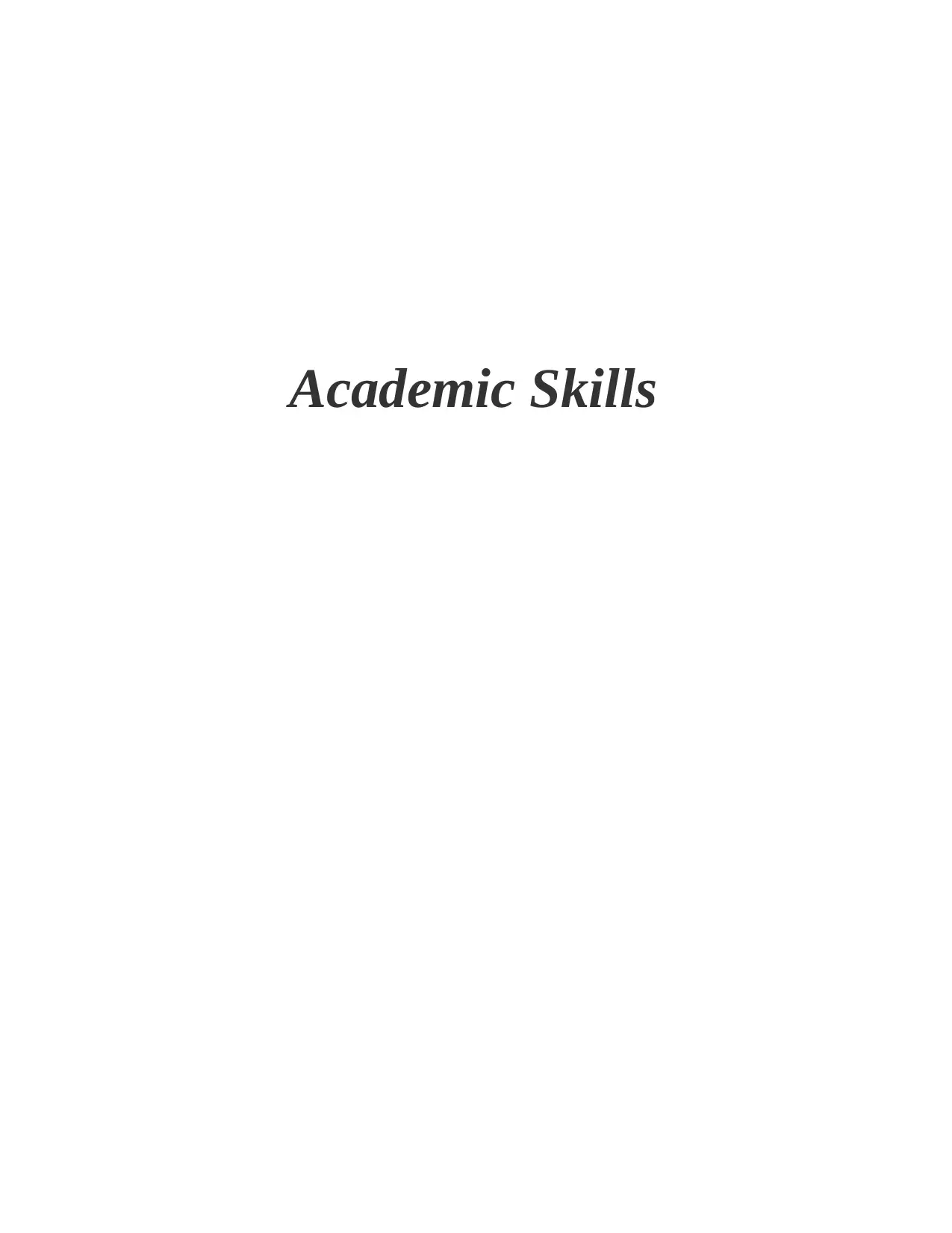
Academic Skills
Paraphrase This Document
Need a fresh take? Get an instant paraphrase of this document with our AI Paraphraser
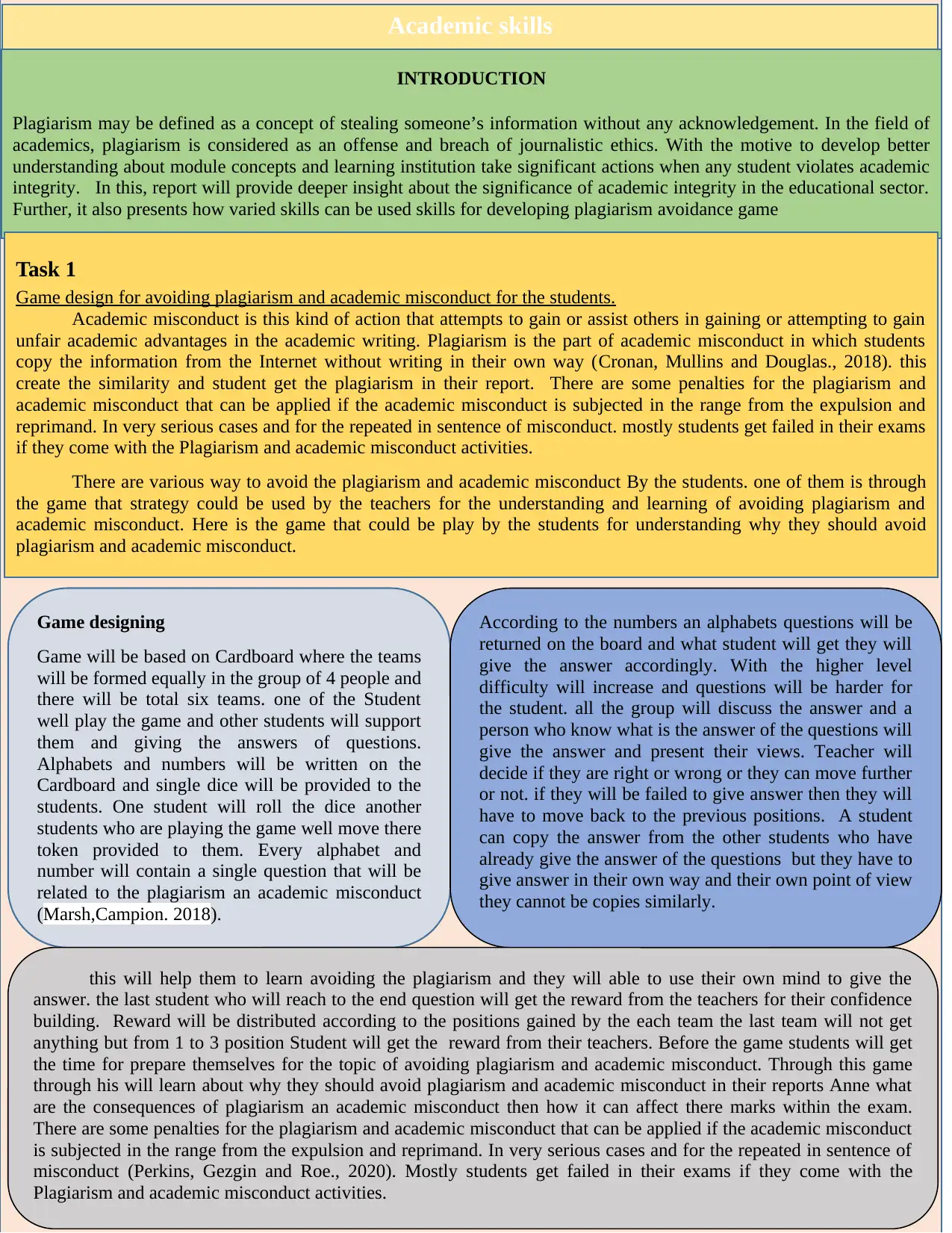
Academic skills
INTRODUCTION
Plagiarism may be defined as a concept of stealing someone’s information without any acknowledgement. In the field of
academics, plagiarism is considered as an offense and breach of journalistic ethics. With the motive to develop better
understanding about module concepts and learning institution take significant actions when any student violates academic
integrity. In this, report will provide deeper insight about the significance of academic integrity in the educational sector.
Further, it also presents how varied skills can be used skills for developing plagiarism avoidance game
Task 1
Game design for avoiding plagiarism and academic misconduct for the students.
Academic misconduct is this kind of action that attempts to gain or assist others in gaining or attempting to gain
unfair academic advantages in the academic writing. Plagiarism is the part of academic misconduct in which students
copy the information from the Internet without writing in their own way (Cronan, Mullins and Douglas., 2018). this
create the similarity and student get the plagiarism in their report. There are some penalties for the plagiarism and
academic misconduct that can be applied if the academic misconduct is subjected in the range from the expulsion and
reprimand. In very serious cases and for the repeated in sentence of misconduct. mostly students get failed in their exams
if they come with the Plagiarism and academic misconduct activities.
There are various way to avoid the plagiarism and academic misconduct By the students. one of them is through
the game that strategy could be used by the teachers for the understanding and learning of avoiding plagiarism and
academic misconduct. Here is the game that could be play by the students for understanding why they should avoid
plagiarism and academic misconduct.
Game designing
Game will be based on Cardboard where the teams
will be formed equally in the group of 4 people and
there will be total six teams. one of the Student
well play the game and other students will support
them and giving the answers of questions.
Alphabets and numbers will be written on the
Cardboard and single dice will be provided to the
students. One student will roll the dice another
students who are playing the game well move there
token provided to them. Every alphabet and
number will contain a single question that will be
related to the plagiarism an academic misconduct
(Marsh,Campion. 2018).
According to the numbers an alphabets questions will be
returned on the board and what student will get they will
give the answer accordingly. With the higher level
difficulty will increase and questions will be harder for
the student. all the group will discuss the answer and a
person who know what is the answer of the questions will
give the answer and present their views. Teacher will
decide if they are right or wrong or they can move further
or not. if they will be failed to give answer then they will
have to move back to the previous positions. A student
can copy the answer from the other students who have
already give the answer of the questions but they have to
give answer in their own way and their own point of view
they cannot be copies similarly.
this will help them to learn avoiding the plagiarism and they will able to use their own mind to give the
answer. the last student who will reach to the end question will get the reward from the teachers for their confidence
building. Reward will be distributed according to the positions gained by the each team the last team will not get
anything but from 1 to 3 position Student will get the reward from their teachers. Before the game students will get
the time for prepare themselves for the topic of avoiding plagiarism and academic misconduct. Through this game
through his will learn about why they should avoid plagiarism and academic misconduct in their reports Anne what
are the consequences of plagiarism an academic misconduct then how it can affect there marks within the exam.
There are some penalties for the plagiarism and academic misconduct that can be applied if the academic misconduct
is subjected in the range from the expulsion and reprimand. In very serious cases and for the repeated in sentence of
misconduct (Perkins, Gezgin and Roe., 2020). Mostly students get failed in their exams if they come with the
Plagiarism and academic misconduct activities.
INTRODUCTION
Plagiarism may be defined as a concept of stealing someone’s information without any acknowledgement. In the field of
academics, plagiarism is considered as an offense and breach of journalistic ethics. With the motive to develop better
understanding about module concepts and learning institution take significant actions when any student violates academic
integrity. In this, report will provide deeper insight about the significance of academic integrity in the educational sector.
Further, it also presents how varied skills can be used skills for developing plagiarism avoidance game
Task 1
Game design for avoiding plagiarism and academic misconduct for the students.
Academic misconduct is this kind of action that attempts to gain or assist others in gaining or attempting to gain
unfair academic advantages in the academic writing. Plagiarism is the part of academic misconduct in which students
copy the information from the Internet without writing in their own way (Cronan, Mullins and Douglas., 2018). this
create the similarity and student get the plagiarism in their report. There are some penalties for the plagiarism and
academic misconduct that can be applied if the academic misconduct is subjected in the range from the expulsion and
reprimand. In very serious cases and for the repeated in sentence of misconduct. mostly students get failed in their exams
if they come with the Plagiarism and academic misconduct activities.
There are various way to avoid the plagiarism and academic misconduct By the students. one of them is through
the game that strategy could be used by the teachers for the understanding and learning of avoiding plagiarism and
academic misconduct. Here is the game that could be play by the students for understanding why they should avoid
plagiarism and academic misconduct.
Game designing
Game will be based on Cardboard where the teams
will be formed equally in the group of 4 people and
there will be total six teams. one of the Student
well play the game and other students will support
them and giving the answers of questions.
Alphabets and numbers will be written on the
Cardboard and single dice will be provided to the
students. One student will roll the dice another
students who are playing the game well move there
token provided to them. Every alphabet and
number will contain a single question that will be
related to the plagiarism an academic misconduct
(Marsh,Campion. 2018).
According to the numbers an alphabets questions will be
returned on the board and what student will get they will
give the answer accordingly. With the higher level
difficulty will increase and questions will be harder for
the student. all the group will discuss the answer and a
person who know what is the answer of the questions will
give the answer and present their views. Teacher will
decide if they are right or wrong or they can move further
or not. if they will be failed to give answer then they will
have to move back to the previous positions. A student
can copy the answer from the other students who have
already give the answer of the questions but they have to
give answer in their own way and their own point of view
they cannot be copies similarly.
this will help them to learn avoiding the plagiarism and they will able to use their own mind to give the
answer. the last student who will reach to the end question will get the reward from the teachers for their confidence
building. Reward will be distributed according to the positions gained by the each team the last team will not get
anything but from 1 to 3 position Student will get the reward from their teachers. Before the game students will get
the time for prepare themselves for the topic of avoiding plagiarism and academic misconduct. Through this game
through his will learn about why they should avoid plagiarism and academic misconduct in their reports Anne what
are the consequences of plagiarism an academic misconduct then how it can affect there marks within the exam.
There are some penalties for the plagiarism and academic misconduct that can be applied if the academic misconduct
is subjected in the range from the expulsion and reprimand. In very serious cases and for the repeated in sentence of
misconduct (Perkins, Gezgin and Roe., 2020). Mostly students get failed in their exams if they come with the
Plagiarism and academic misconduct activities.
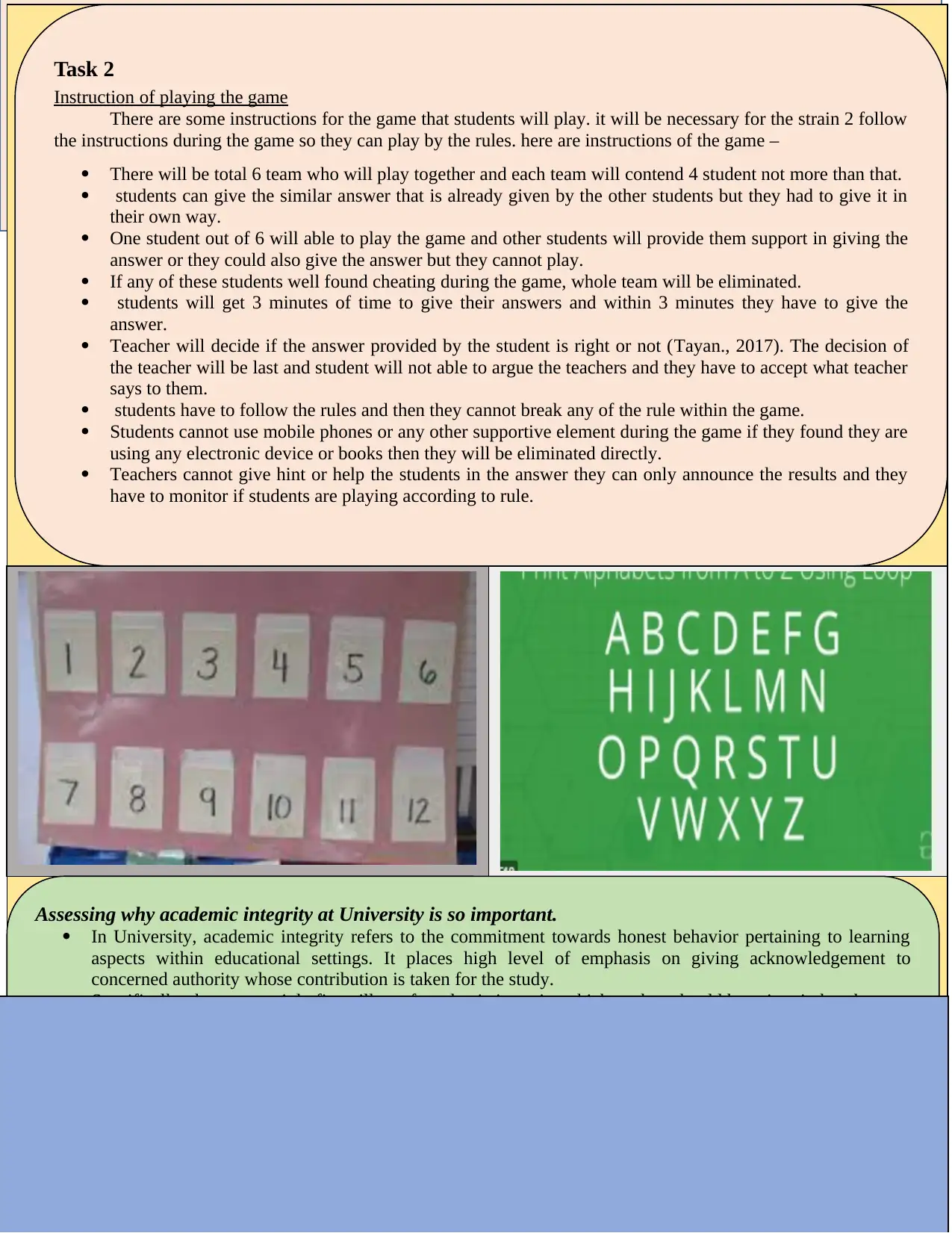
Task 2
Instruction of playing the game
There are some instructions for the game that students will play. it will be necessary for the strain 2 follow
the instructions during the game so they can play by the rules. here are instructions of the game –
There will be total 6 team who will play together and each team will contend 4 student not more than that.
students can give the similar answer that is already given by the other students but they had to give it in
their own way.
One student out of 6 will able to play the game and other students will provide them support in giving the
answer or they could also give the answer but they cannot play.
If any of these students well found cheating during the game, whole team will be eliminated.
students will get 3 minutes of time to give their answers and within 3 minutes they have to give the
answer.
Teacher will decide if the answer provided by the student is right or not (Tayan., 2017). The decision of
the teacher will be last and student will not able to argue the teachers and they have to accept what teacher
says to them.
students have to follow the rules and then they cannot break any of the rule within the game.
Students cannot use mobile phones or any other supportive element during the game if they found they are
using any electronic device or books then they will be eliminated directly.
Teachers cannot give hint or help the students in the answer they can only announce the results and they
have to monitor if students are playing according to rule.
Assessing why academic integrity at University is so important.
In University, academic integrity refers to the commitment towards honest behavior pertaining to learning
aspects within educational settings. It places high level of emphasis on giving acknowledgement to
concerned authority whose contribution is taken for the study.
Specifically, there are mainly five pillars of academic integrity which student should keep in mind such as
honesty, trust, fairness, respect and responsibility. Hence, academic integrity highly significant from the
perspective of learning and improving skills (Updike and et.al, 2021).
In addition to this, by complying with such aspect student can avoid undesirable consequences in relation to failing or
leaving university. Moreover, University has right to terminate students in the case of any misconduct where students
should adhere to academic standards which further enhance competitively. Academic integrity receives due credit
among students, where they submit for assessments towards further professional success in their individual academics.
It also heads on focus towards interests of students to not conduct any cheats, professionally grown in varied untapped
scenarios by working towards new expertise skills. This also enables students are being awarded with degrees in their
success, standards and professional requirements for further success in programmers.
Instruction of playing the game
There are some instructions for the game that students will play. it will be necessary for the strain 2 follow
the instructions during the game so they can play by the rules. here are instructions of the game –
There will be total 6 team who will play together and each team will contend 4 student not more than that.
students can give the similar answer that is already given by the other students but they had to give it in
their own way.
One student out of 6 will able to play the game and other students will provide them support in giving the
answer or they could also give the answer but they cannot play.
If any of these students well found cheating during the game, whole team will be eliminated.
students will get 3 minutes of time to give their answers and within 3 minutes they have to give the
answer.
Teacher will decide if the answer provided by the student is right or not (Tayan., 2017). The decision of
the teacher will be last and student will not able to argue the teachers and they have to accept what teacher
says to them.
students have to follow the rules and then they cannot break any of the rule within the game.
Students cannot use mobile phones or any other supportive element during the game if they found they are
using any electronic device or books then they will be eliminated directly.
Teachers cannot give hint or help the students in the answer they can only announce the results and they
have to monitor if students are playing according to rule.
Assessing why academic integrity at University is so important.
In University, academic integrity refers to the commitment towards honest behavior pertaining to learning
aspects within educational settings. It places high level of emphasis on giving acknowledgement to
concerned authority whose contribution is taken for the study.
Specifically, there are mainly five pillars of academic integrity which student should keep in mind such as
honesty, trust, fairness, respect and responsibility. Hence, academic integrity highly significant from the
perspective of learning and improving skills (Updike and et.al, 2021).
In addition to this, by complying with such aspect student can avoid undesirable consequences in relation to failing or
leaving university. Moreover, University has right to terminate students in the case of any misconduct where students
should adhere to academic standards which further enhance competitively. Academic integrity receives due credit
among students, where they submit for assessments towards further professional success in their individual academics.
It also heads on focus towards interests of students to not conduct any cheats, professionally grown in varied untapped
scenarios by working towards new expertise skills. This also enables students are being awarded with degrees in their
success, standards and professional requirements for further success in programmers.
⊘ This is a preview!⊘
Do you want full access?
Subscribe today to unlock all pages.

Trusted by 1+ million students worldwide
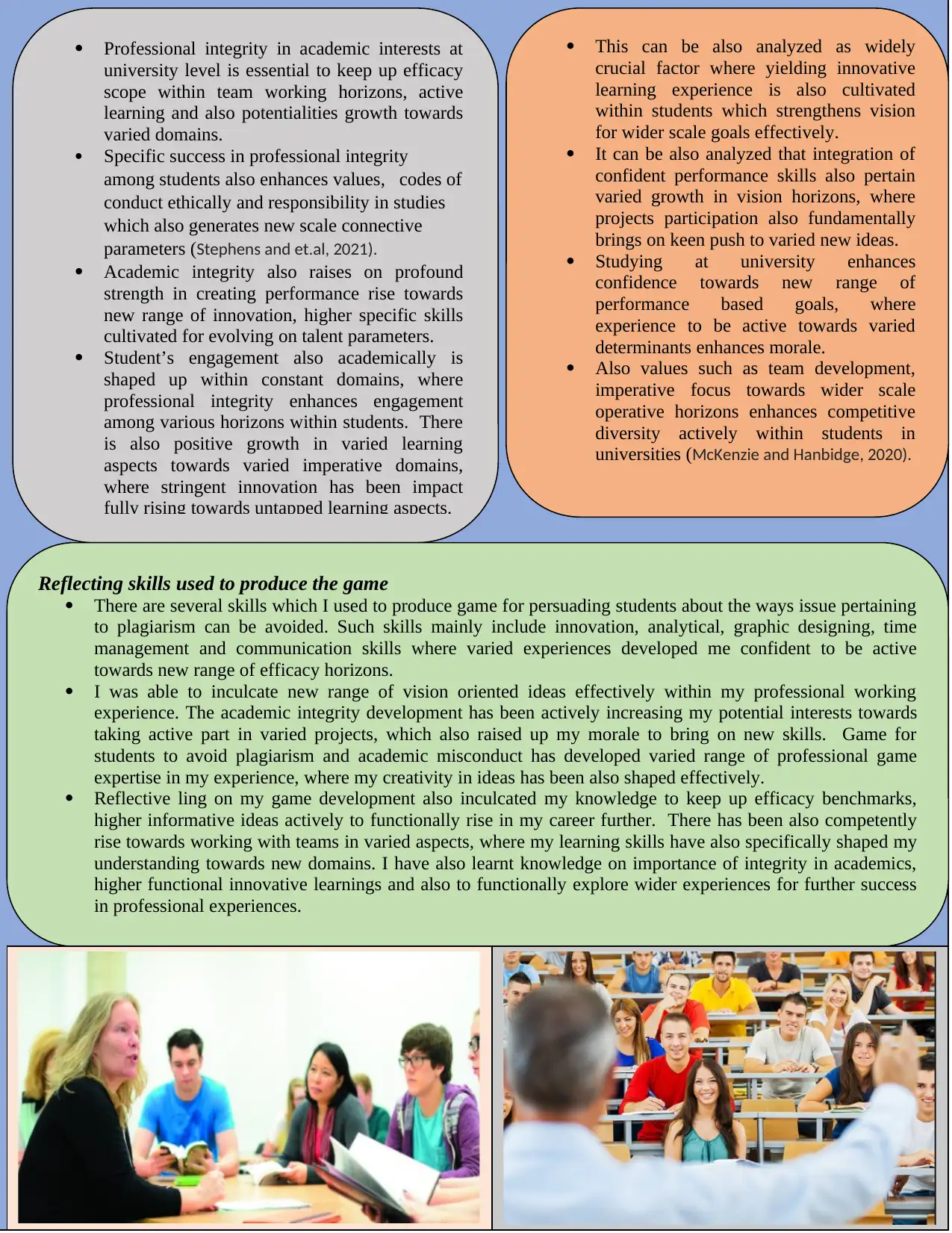
Professional integrity in academic interests at
university level is essential to keep up efficacy
scope within team working horizons, active
learning and also potentialities growth towards
varied domains.
Specific success in professional integrity
among students also enhances values, codes of
conduct ethically and responsibility in studies
which also generates new scale connective
parameters (Stephens and et.al, 2021).
Academic integrity also raises on profound
strength in creating performance rise towards
new range of innovation, higher specific skills
cultivated for evolving on talent parameters.
Student’s engagement also academically is
shaped up within constant domains, where
professional integrity enhances engagement
among various horizons within students. There
is also positive growth in varied learning
aspects towards varied imperative domains,
where stringent innovation has been impact
fully rising towards untapped learning aspects.
This can be also analyzed as widely
crucial factor where yielding innovative
learning experience is also cultivated
within students which strengthens vision
for wider scale goals effectively.
It can be also analyzed that integration of
confident performance skills also pertain
varied growth in vision horizons, where
projects participation also fundamentally
brings on keen push to varied new ideas.
Studying at university enhances
confidence towards new range of
performance based goals, where
experience to be active towards varied
determinants enhances morale.
Also values such as team development,
imperative focus towards wider scale
operative horizons enhances competitive
diversity actively within students in
universities (McKenzie and Hanbidge, 2020).
Reflecting skills used to produce the game
There are several skills which I used to produce game for persuading students about the ways issue pertaining
to plagiarism can be avoided. Such skills mainly include innovation, analytical, graphic designing, time
management and communication skills where varied experiences developed me confident to be active
towards new range of efficacy horizons.
I was able to inculcate new range of vision oriented ideas effectively within my professional working
experience. The academic integrity development has been actively increasing my potential interests towards
taking active part in varied projects, which also raised up my morale to bring on new skills. Game for
students to avoid plagiarism and academic misconduct has developed varied range of professional game
expertise in my experience, where my creativity in ideas has been also shaped effectively.
Reflective ling on my game development also inculcated my knowledge to keep up efficacy benchmarks,
higher informative ideas actively to functionally rise in my career further. There has been also competently
rise towards working with teams in varied aspects, where my learning skills have also specifically shaped my
understanding towards new domains. I have also learnt knowledge on importance of integrity in academics,
higher functional innovative learnings and also to functionally explore wider experiences for further success
in professional experiences.
university level is essential to keep up efficacy
scope within team working horizons, active
learning and also potentialities growth towards
varied domains.
Specific success in professional integrity
among students also enhances values, codes of
conduct ethically and responsibility in studies
which also generates new scale connective
parameters (Stephens and et.al, 2021).
Academic integrity also raises on profound
strength in creating performance rise towards
new range of innovation, higher specific skills
cultivated for evolving on talent parameters.
Student’s engagement also academically is
shaped up within constant domains, where
professional integrity enhances engagement
among various horizons within students. There
is also positive growth in varied learning
aspects towards varied imperative domains,
where stringent innovation has been impact
fully rising towards untapped learning aspects.
This can be also analyzed as widely
crucial factor where yielding innovative
learning experience is also cultivated
within students which strengthens vision
for wider scale goals effectively.
It can be also analyzed that integration of
confident performance skills also pertain
varied growth in vision horizons, where
projects participation also fundamentally
brings on keen push to varied new ideas.
Studying at university enhances
confidence towards new range of
performance based goals, where
experience to be active towards varied
determinants enhances morale.
Also values such as team development,
imperative focus towards wider scale
operative horizons enhances competitive
diversity actively within students in
universities (McKenzie and Hanbidge, 2020).
Reflecting skills used to produce the game
There are several skills which I used to produce game for persuading students about the ways issue pertaining
to plagiarism can be avoided. Such skills mainly include innovation, analytical, graphic designing, time
management and communication skills where varied experiences developed me confident to be active
towards new range of efficacy horizons.
I was able to inculcate new range of vision oriented ideas effectively within my professional working
experience. The academic integrity development has been actively increasing my potential interests towards
taking active part in varied projects, which also raised up my morale to bring on new skills. Game for
students to avoid plagiarism and academic misconduct has developed varied range of professional game
expertise in my experience, where my creativity in ideas has been also shaped effectively.
Reflective ling on my game development also inculcated my knowledge to keep up efficacy benchmarks,
higher informative ideas actively to functionally rise in my career further. There has been also competently
rise towards working with teams in varied aspects, where my learning skills have also specifically shaped my
understanding towards new domains. I have also learnt knowledge on importance of integrity in academics,
higher functional innovative learnings and also to functionally explore wider experiences for further success
in professional experiences.
Paraphrase This Document
Need a fresh take? Get an instant paraphrase of this document with our AI Paraphraser
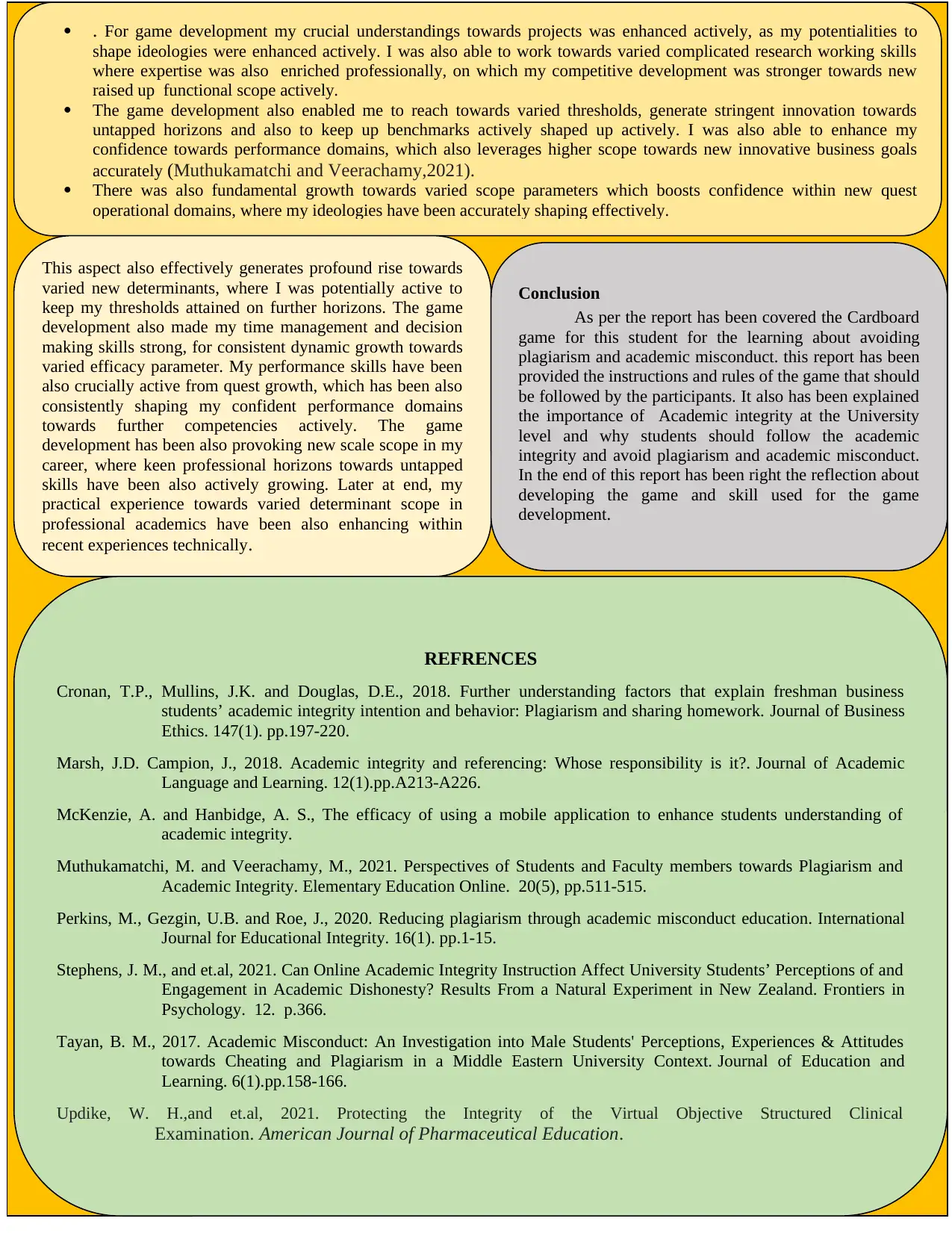
. For game development my crucial understandings towards projects was enhanced actively, as my potentialities to
shape ideologies were enhanced actively. I was also able to work towards varied complicated research working skills
where expertise was also enriched professionally, on which my competitive development was stronger towards new
raised up functional scope actively.
The game development also enabled me to reach towards varied thresholds, generate stringent innovation towards
untapped horizons and also to keep up benchmarks actively shaped up actively. I was also able to enhance my
confidence towards performance domains, which also leverages higher scope towards new innovative business goals
accurately (Muthukamatchi and Veerachamy,2021).
There was also fundamental growth towards varied scope parameters which boosts confidence within new quest
operational domains, where my ideologies have been accurately shaping effectively.
This aspect also effectively generates profound rise towards
varied new determinants, where I was potentially active to
keep my thresholds attained on further horizons. The game
development also made my time management and decision
making skills strong, for consistent dynamic growth towards
varied efficacy parameter. My performance skills have been
also crucially active from quest growth, which has been also
consistently shaping my confident performance domains
towards further competencies actively. The game
development has been also provoking new scale scope in my
career, where keen professional horizons towards untapped
skills have been also actively growing. Later at end, my
practical experience towards varied determinant scope in
professional academics have been also enhancing within
recent experiences technically.
Conclusion
As per the report has been covered the Cardboard
game for this student for the learning about avoiding
plagiarism and academic misconduct. this report has been
provided the instructions and rules of the game that should
be followed by the participants. It also has been explained
the importance of Academic integrity at the University
level and why students should follow the academic
integrity and avoid plagiarism and academic misconduct.
In the end of this report has been right the reflection about
developing the game and skill used for the game
development.
REFRENCES
Cronan, T.P., Mullins, J.K. and Douglas, D.E., 2018. Further understanding factors that explain freshman business
students’ academic integrity intention and behavior: Plagiarism and sharing homework. Journal of Business
Ethics. 147(1). pp.197-220.
Marsh, J.D. Campion, J., 2018. Academic integrity and referencing: Whose responsibility is it?. Journal of Academic
Language and Learning. 12(1).pp.A213-A226.
McKenzie, A. and Hanbidge, A. S., The efficacy of using a mobile application to enhance students understanding of
academic integrity.
Muthukamatchi, M. and Veerachamy, M., 2021. Perspectives of Students and Faculty members towards Plagiarism and
Academic Integrity. Elementary Education Online. 20(5), pp.511-515.
Perkins, M., Gezgin, U.B. and Roe, J., 2020. Reducing plagiarism through academic misconduct education. International
Journal for Educational Integrity. 16(1). pp.1-15.
Stephens, J. M., and et.al, 2021. Can Online Academic Integrity Instruction Affect University Students’ Perceptions of and
Engagement in Academic Dishonesty? Results From a Natural Experiment in New Zealand. Frontiers in
Psychology. 12. p.366.
Tayan, B. M., 2017. Academic Misconduct: An Investigation into Male Students' Perceptions, Experiences & Attitudes
towards Cheating and Plagiarism in a Middle Eastern University Context. Journal of Education and
Learning. 6(1).pp.158-166.
Updike, W. H.,and et.al, 2021. Protecting the Integrity of the Virtual Objective Structured Clinical
Examination. American Journal of Pharmaceutical Education.
shape ideologies were enhanced actively. I was also able to work towards varied complicated research working skills
where expertise was also enriched professionally, on which my competitive development was stronger towards new
raised up functional scope actively.
The game development also enabled me to reach towards varied thresholds, generate stringent innovation towards
untapped horizons and also to keep up benchmarks actively shaped up actively. I was also able to enhance my
confidence towards performance domains, which also leverages higher scope towards new innovative business goals
accurately (Muthukamatchi and Veerachamy,2021).
There was also fundamental growth towards varied scope parameters which boosts confidence within new quest
operational domains, where my ideologies have been accurately shaping effectively.
This aspect also effectively generates profound rise towards
varied new determinants, where I was potentially active to
keep my thresholds attained on further horizons. The game
development also made my time management and decision
making skills strong, for consistent dynamic growth towards
varied efficacy parameter. My performance skills have been
also crucially active from quest growth, which has been also
consistently shaping my confident performance domains
towards further competencies actively. The game
development has been also provoking new scale scope in my
career, where keen professional horizons towards untapped
skills have been also actively growing. Later at end, my
practical experience towards varied determinant scope in
professional academics have been also enhancing within
recent experiences technically.
Conclusion
As per the report has been covered the Cardboard
game for this student for the learning about avoiding
plagiarism and academic misconduct. this report has been
provided the instructions and rules of the game that should
be followed by the participants. It also has been explained
the importance of Academic integrity at the University
level and why students should follow the academic
integrity and avoid plagiarism and academic misconduct.
In the end of this report has been right the reflection about
developing the game and skill used for the game
development.
REFRENCES
Cronan, T.P., Mullins, J.K. and Douglas, D.E., 2018. Further understanding factors that explain freshman business
students’ academic integrity intention and behavior: Plagiarism and sharing homework. Journal of Business
Ethics. 147(1). pp.197-220.
Marsh, J.D. Campion, J., 2018. Academic integrity and referencing: Whose responsibility is it?. Journal of Academic
Language and Learning. 12(1).pp.A213-A226.
McKenzie, A. and Hanbidge, A. S., The efficacy of using a mobile application to enhance students understanding of
academic integrity.
Muthukamatchi, M. and Veerachamy, M., 2021. Perspectives of Students and Faculty members towards Plagiarism and
Academic Integrity. Elementary Education Online. 20(5), pp.511-515.
Perkins, M., Gezgin, U.B. and Roe, J., 2020. Reducing plagiarism through academic misconduct education. International
Journal for Educational Integrity. 16(1). pp.1-15.
Stephens, J. M., and et.al, 2021. Can Online Academic Integrity Instruction Affect University Students’ Perceptions of and
Engagement in Academic Dishonesty? Results From a Natural Experiment in New Zealand. Frontiers in
Psychology. 12. p.366.
Tayan, B. M., 2017. Academic Misconduct: An Investigation into Male Students' Perceptions, Experiences & Attitudes
towards Cheating and Plagiarism in a Middle Eastern University Context. Journal of Education and
Learning. 6(1).pp.158-166.
Updike, W. H.,and et.al, 2021. Protecting the Integrity of the Virtual Objective Structured Clinical
Examination. American Journal of Pharmaceutical Education.
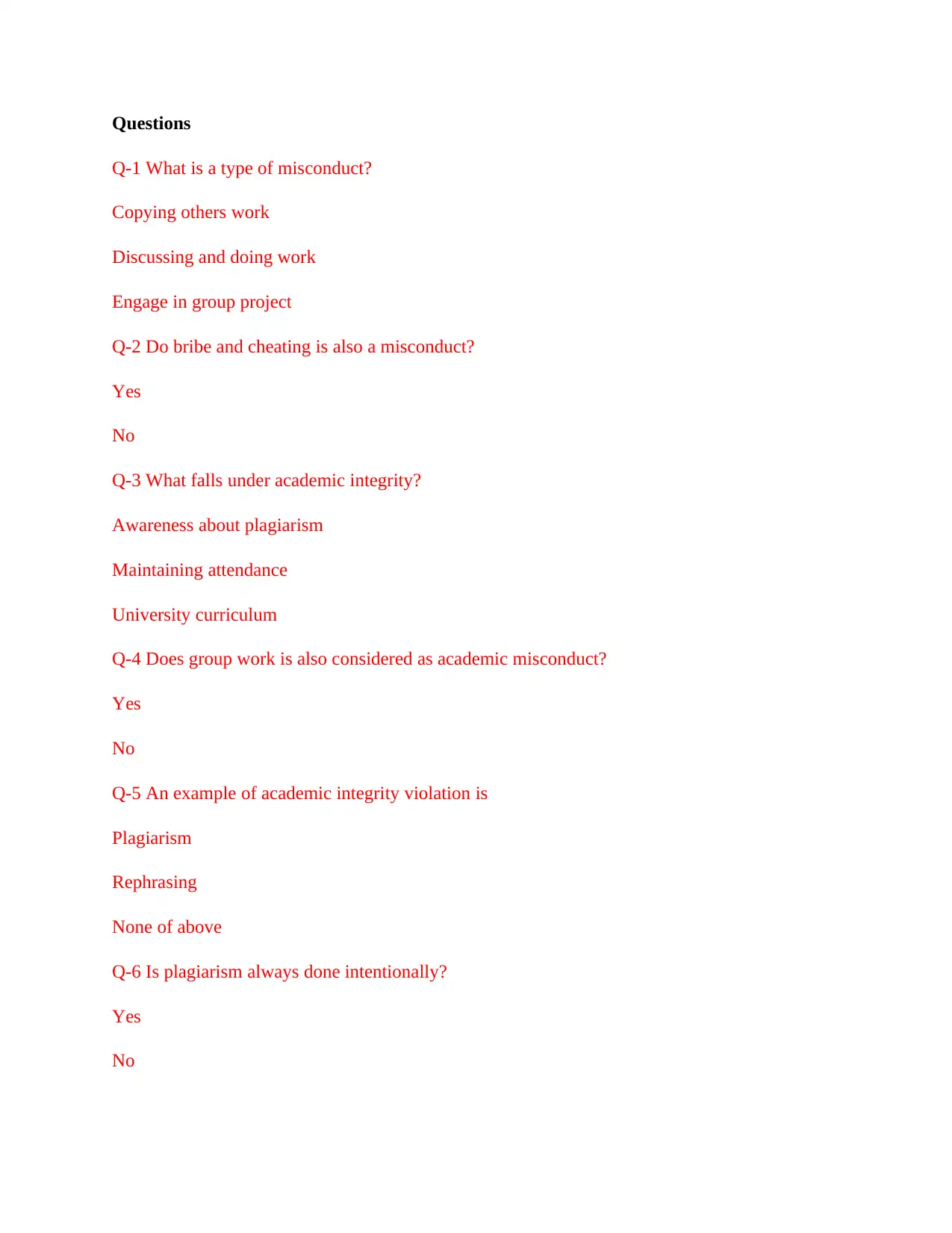
Questions
Q-1 What is a type of misconduct?
Copying others work
Discussing and doing work
Engage in group project
Q-2 Do bribe and cheating is also a misconduct?
Yes
No
Q-3 What falls under academic integrity?
Awareness about plagiarism
Maintaining attendance
University curriculum
Q-4 Does group work is also considered as academic misconduct?
Yes
No
Q-5 An example of academic integrity violation is
Plagiarism
Rephrasing
None of above
Q-6 Is plagiarism always done intentionally?
Yes
No
Q-1 What is a type of misconduct?
Copying others work
Discussing and doing work
Engage in group project
Q-2 Do bribe and cheating is also a misconduct?
Yes
No
Q-3 What falls under academic integrity?
Awareness about plagiarism
Maintaining attendance
University curriculum
Q-4 Does group work is also considered as academic misconduct?
Yes
No
Q-5 An example of academic integrity violation is
Plagiarism
Rephrasing
None of above
Q-6 Is plagiarism always done intentionally?
Yes
No
⊘ This is a preview!⊘
Do you want full access?
Subscribe today to unlock all pages.

Trusted by 1+ million students worldwide
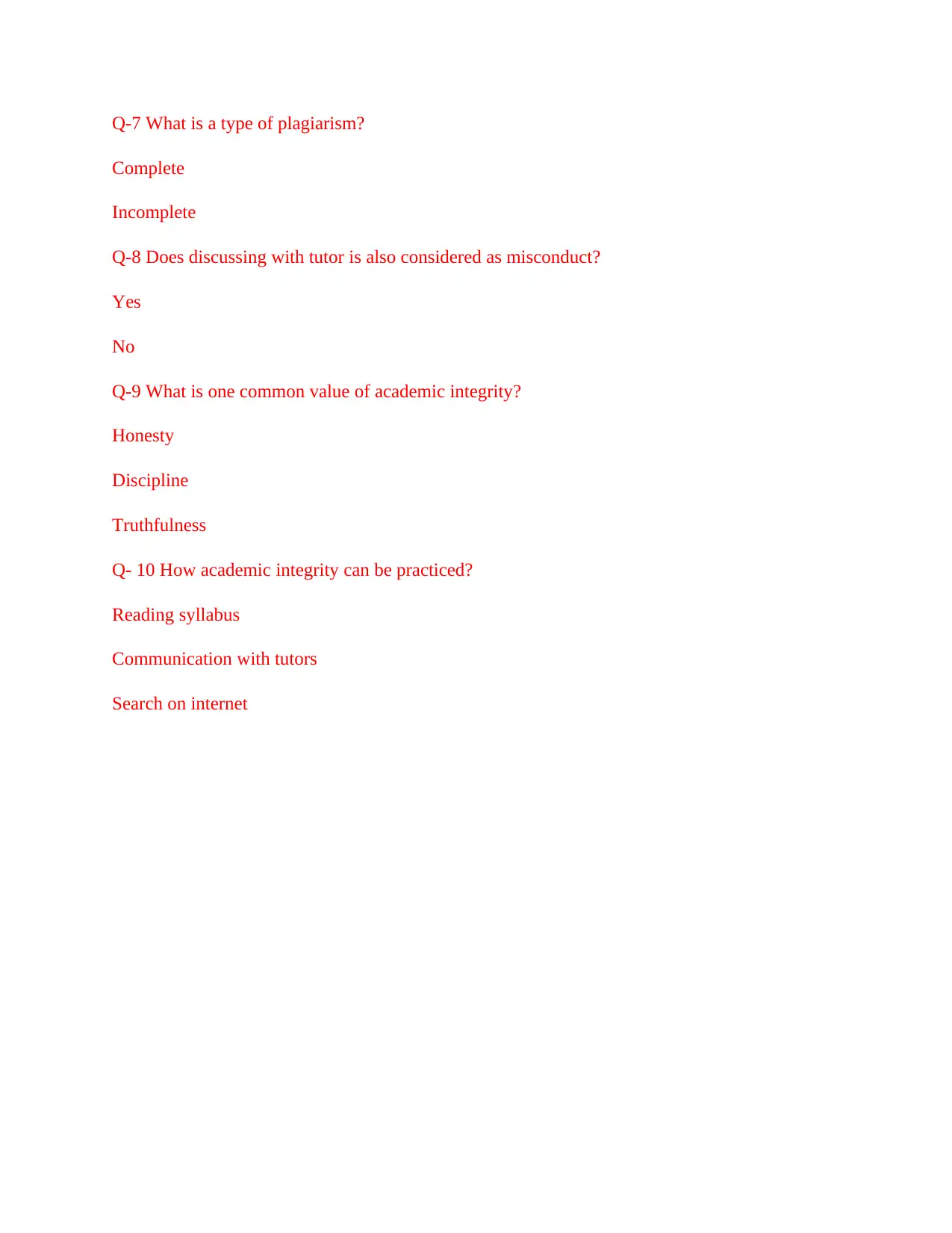
Q-7 What is a type of plagiarism?
Complete
Incomplete
Q-8 Does discussing with tutor is also considered as misconduct?
Yes
No
Q-9 What is one common value of academic integrity?
Honesty
Discipline
Truthfulness
Q- 10 How academic integrity can be practiced?
Reading syllabus
Communication with tutors
Search on internet
Complete
Incomplete
Q-8 Does discussing with tutor is also considered as misconduct?
Yes
No
Q-9 What is one common value of academic integrity?
Honesty
Discipline
Truthfulness
Q- 10 How academic integrity can be practiced?
Reading syllabus
Communication with tutors
Search on internet
1 out of 7
Related Documents
Your All-in-One AI-Powered Toolkit for Academic Success.
+13062052269
info@desklib.com
Available 24*7 on WhatsApp / Email
![[object Object]](/_next/static/media/star-bottom.7253800d.svg)
Unlock your academic potential
Copyright © 2020–2026 A2Z Services. All Rights Reserved. Developed and managed by ZUCOL.



